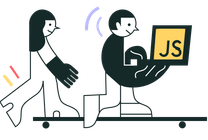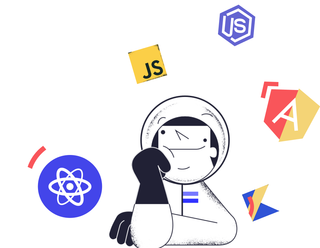First and foremost, you should know that there’s no one right way to build a website. What you use in the end all depends on your needs and business demands. Sometimes a basic HTML site is all you need, other times you may need to develop a completely bespoke site to appeal to your customer base, while standard CMS sites allow you to make basic updates easily.
To help you decide which web development strategy is best for you, let’s look at the advantages and disadvantages of each.

HTML
Description: HTML sites are best for the most basic types of sites. Static in nature, they offer a quick and cheap way to build an online presence that you can use to market your company. Development skills for this type of website are relatively simple, meaning you can hire a relatively junior developer to maintain the site as you grow. However, HTML really only works for smaller sites, and isn’t an effective tool for e-commerce. To get an idea of how much it would cost to build a basic HTML site, you can use this quick calculation tool.
Pros: cheap, quick to build, low level programming skills to update
Cons: static website that requires programming skills to update, can’t be used for e-commerce, difficult to use for complex sites.
Who it’s best for: companies looking for a basic online presence with company description and contact details.

Standard CMS
Description: A Content Management System (CMS) website is quite simple to set up. There are standard site layouts that you can purchase and you can buy a design to fill it in. You can hire a company to do this for you, but they’ll charge quite a high premium to develop them for you. However, CMS sites can be good for standard e-commerce sites, and it can be useful to hire a developer to help you with this. You should also remember that because most e-commerce sites have some custom elements, CMS is usually best for MVPs, while you’d have to hire a developer to build your final product from scratch.
Another key advantage to CMS sites is that once you’ve set them up, you can change content relatively simply, although if you want to make major changes, you’ll need a custom site. Standard CMS can also be useful for blogs, because the content can be so easily updated
Pros: some adaptable content with no developer, can build MVPs for e-commerce, cheaper than custom sites
Cons: more expensive than HTML, no customization, often need to build new site from scratch as company grows, mostly only suitable for MVPs
Who it’s best for: companies building MVPs to be rebuilt once bigger investment is secured, basic e-commerce, blogs

Custom Development
Description: custom web development is the most useful way of building a website if you want to build a long-term business through an internet presence — basically everyone these days. For some businesses, like a local car dealership, this may be too much, because you sell most of your cars in person. However, if you want to make sales over the internet, you need at least a CMS website.
One of the advantages of developing a custom site as opposed to a basic CMS design is that there are no limitations based on the standard layout. You can build whatever elements you want to help increase your sales and build elements that give your company a real unique selling point. You can also update parts of your website, like a standard CMS site.
Another major benefit of building your own custom website is that they can be easily scaled. It’s important to note that how well the site can scale is largely dependent on the quality of the code. Standard CMS sites or low-quality code custom sites can get buggy and have delays as users increase. If you’re building a site to handle a large load of clients, it’s best to find a skilled team of developers to do it for you.
However, skilled developers can be quite expensive, which is difficult for some newer and smaller businesses to handle. If you’re just starting out and don’t have much funding, it might be expensive for you to build the site you want from the beginning, but it will save you time and money down the road.
Pros: completely customizable, scalable, can update content, better presentation of unique selling points,
Cons: can be pricey, requires experienced professional team, major updates more complex
Who it’s best for: established companies looking to build an online store, aggregators, startups looking to build an online company, news sites
Conclusion
If you’re looking to build a new website, you have several options to choose from, and the one that’s right for you depends on many factors. As you grow your business, you may decide to change what you originally built. Choosing the right model to start with can save you time and money and help you grow faster.
